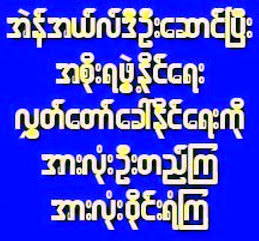
P.O Box 93, Mae Sot, Tak Province 63110, Thailand
e.mail: info@aappb.org website: www.aappb.org
------------------------------
Statement
October 31, 2008
November 2nd is the bi-annual anniversary of cyclone Nargis which struck Burma on 2 May and left more than 140,000 people dead or missing.
The military government arrested at least 20 volunteers after they helped cyclone victims. On 4th June, U Thura alias Zargana, a well-known comedian, became the first volunteer to be arrested by the authorities. 6 weeks after the disaster, Dr. Nay Win (Ne Win), Ma Hnin Pwint Wai, his daughter, U Aung Kyaw San, Ko Lin Htet Naing and Ko Hein Yaza Tun were arrested in Pya Pon Township, in the Irrawaddy delta. Their activities were not causing any harm to local people or the authorities. They just collected and buried the bodies of cyclone victims. On 1st October, U Ohn Kyaing was arrested. He is the chairperson of the Cyclone Relief Committee, National League for Democracy. He is now reportedly under investigation whilst in prison, accused of using funds collected to help victims of Cyclone Nargis to plan acts of terrorism.
Since 1988 to date, 137 political prisoners have died in prison. Many political prisoners are in poor health. Prison conditions are harsh and detainees are often denied vital medical treatment.
Recently, a monk escaped from a labor camp. His name is U Pyinyarthiri. He was imprisoned for three years after the peaceful demonstrations in September 2007. He was sent to Lend Tlann prison camp in Tiddim Township, Chin State. After three and half months in the camp, he decided to escape because of the harsh conditions.
He is currently in Mizoram State of India. In an interview with Mizzima News Agency, he talked about the torture he endured under interrogation. He said, “They kicked my chest with their combat boots and stomped on my face with my hands handcuffed behind me. Every question was accompanied by kicks and punches to my head and body. I was almost unconscious. I fell on the table in front of me when they kicked me from the back. At last I could not endure anymore such torture. They twisted my arms and tried to break them, which affected the nervous system in my hand. They pressed between my rib bones. They slapped me on my temple and pulled my earlobes violently. They stepped on my shins which left me with severe pain until I was sentenced to prison term. I could not walk well.”
Monks are highly revered in Burma, yet they are currently facing torture and ill-treatment in prisons. Cyclone volunteers and activists also face difficult and dangerous conditions in prison.
“Recently, some political prisoners have been forced to confess that they are responsible for planting bombs. In the past, the authorities blamed bomb attacks on armed groups. Now, they are pointing the finger at politicians like U Ohn Kyaing,” said Ko Tate Naing, secretary of the Assistance Association for Political Prisoners (Burma).
“The authorities are doing whatever they can to ensure long imprisonments for human rights activists and volunteers who worked to help cyclone victims,” continued Ko Tate Naing. We want to urge the authorities to stop this persecution and release these activists immediately and unconditionally. We also call on the United Nations and the international community to take concrete action to secure their freedom.”
Assistance Association for Political Prisoners (Burma)
More information, please contact:
Ko Tate Naing on +66-(0)81-2878751
Ko Bo Kyi on +66-(0) 81-3248935
P.O Box 93, Mae Sot, Tak Province 63110, Thailand
e.mail: info@aappb.org website: www.aappb.org
------------------------------
xkwfjyefa=unmcsuf
&ufpGJ? ? atmufwdkbmv 31 &uf/ 2008
vmrnfh Edk0ifbmv 2 ae@onf jrefrmedkifiHwGif em*pf qdkifuvHk;rkefwdkif; wdkwfcwfcJhonfh 6 v jynfhae@jzpfonf? xdkrkefwdkif;'%fa=umifh vlaygif; wodef;ausmf aoa=u aysmufqHk;&onf? aemufqufwGJtaejzifh etz ppftpdk;&u xdkavab;'%fcH&onfh olrsm;. 'kuQrsm;udk ulnDajz&Sif;ay;cJhonfh apwemh0efxrf; 20 ausmf zrf;qD;jcif; axmifcsjcif;rsm; jyKvkyfaejcif;jzpfonf?
a'gufwmae0if;/ 4if;. orD;jzpfol rESif;yGifha0/ OD;atmifausmfqef;/ udkvif;xufEdkif/ udk[def;&mZmxGef;wdk@onf zsmyHk+rdK@wGif zrf;qD;cHcJh&onf? em*pfrkefwdkif;t+yD; wvcGJt=umwGif zrf;qD;cHcJh=u&jcif;jzpfonf? 4if;wdk@. aqmif&GufcsufrSm a'ocHvlxkudkaomfvnf;aumif;/ tm%mydkifrsm;ukdaomfvnf;aumif;
em*pfrkefwdkif;'%fcH&
xdkodk@ vlr_0efxrf;pdwftjynfhjzifh ulnDaqmif&Gufay;aeaom apwem&Sifvkyfom;rsm;udk zrf;qD;jcif;onf etztaejzifh jynfolvlxk. tusdK;udk vHk;0 rvdkvm;a=umif;jyovdkufjcif;
1988 ckESpfrS ,ae@tcsdeftxd tusOf;axmifrsm;twGif; aoqHk;cJholaygif; 137 OD;&SdcJh+yD; ,cktcg usrRma&;tvGefqdk;&Gm;aeolrsm;
+yD;cJhonfhESpfu oHCmhv_yf&Sm;r_wGif yg0ifcJhonfh oHCmwyg;u 4if;zrf;qD;cH&+yD;aemuf n‡if;yef;ESdyfpufcH&+yD; axmif 3 ESpf cscHcJh&a=umif; r=umao;rDu owif;Ïmersm;odk@ &Sif;vif;jyocJhonf?
n‡if;yef;ESdyfpufr_ESifh ywfouf+yD; “&ifbwfudk ppfzdeyfeJ@ aqmifhuefw,f? rsufESmudk ppfzdeyfeJ@ aygufw,f? aemufjyefvufxdyfcwfxm;w,f? ar;cGef;wckar;wdkif; OD;Zif;udk em;&if;yg;&if;&dkufw,f? vufoD;eJ@xdk;w,f? arhajrmoGm;atmifcHpm;&w,f? aemufu ypf&dkufwm a&Spm;yGJay:arSmufoGm;w,f? aemufqHk; OD;Zif;vnf; vHk;rcHEkdifawmhbl;/ vufta=umawG/ vufawGudk csdK;w,f? usOfa=umawGESyfw,f? eH=um;awGudk axmuf+yD;awmh r wmawG&Sdw,f? enf;rsdK;pHkeJ@ ppfaq;w,f? ajcaxmufawGudk wuf}udwfwmu OD;Zif;axmifuswJhtcsdefxd vrf;udk aumif;aumif;rav#mufEdkifbl;”[k rZÆdr owif;Ïmeodk@ jyefvnfajym=um;cJhonf? xdkoHCmrSm OD;ynmoD&djzpf+yD; csif;jynfe,f/ wD;wdef+rdK@e,f vifwef&Jbufpcef;wGif 3 v cGJ=um tvkyf=urf; vkyfudkifcJh&oljzpfonf? tvkyf=urf;'%frcHEdkifI aemufqHk; xGufajy;vGwfajrmufvm+yD; ,cktcg tdENd,EdkifiH/ rdZdk&rfjynfe,f/ tdkufaZm+rdK@wGif oDwif;oHk;vsuf&Sdonf? &[ef;oHCmrsm;udkyif xdkodk@ jyKrlv#if vlr_a&;vkyfief;rsm;
r=umao;rDu EdkifiHa&;tusOf;om;tcsdK@udk AHk;azmufcGJolrsm;jzpfa=umif; twif;t=uyf cH0efvufrSwfrsm;xkd;cdkif;
“'ga=umifh 'Drdkua&pDESifh vl@tcGifhta&; v_yf&Sm;olrsm;/ vlr_a&;vkyfief;rsm; vkyfudkifaeolrsm;udk tjypfwpHkw&mr&SdbJ ta=umif;trsdK;rsdK;jy/ yk'frtrsdK;rsdK;wyf+yD; ESpf&Snfaxmif'%frsm; csrSwf&ef pDpOfaqmifaejcif;rsm;tm; csufcsif;&yfwef@+yD; c|if;csufr&dS tjrefqHk; jyefv$wfay;&ef jrefrmppftpkd;&tm; awmif;qdkvdkufygw,f? wqufwnf;rSm ukvor*~tygt0if EdkifiHwum rdom;pkrsm;uvnf; 4if;wdk@vGwfajrmufa&;twGuf 0dkif;0ef; ta&;,laqmif&Gufay;&ef wdkufwGef;vdkygw,f? [k qufvuf ajymqdkvdkufonf?”
EdkifiHa&;tusOf;om;rsm;
qufoG,f&ef -
ukdwdwfEkdif (66) 81 287 8751
ukdbdk=unf (66) 81 324 8935







